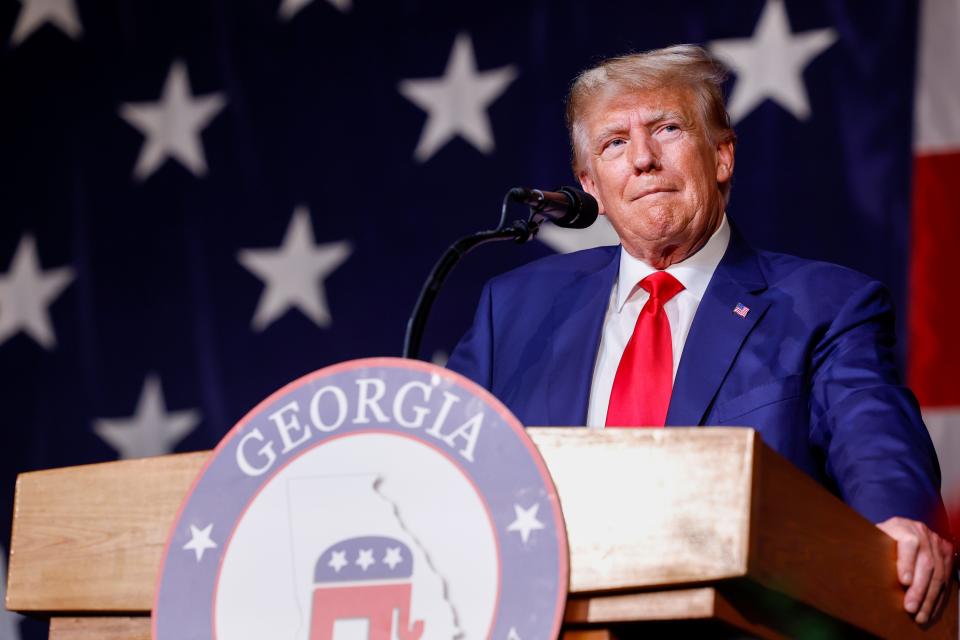Delay, delay, delay: Here's how Donald Trump is trying to push back his criminals trials
- Oops!Something went wrong.Please try again later.
WASHINGTON — Faced with the prospect of campaigning for president while sitting in courtrooms, former President Donald Trump is planning to adopt a basic legal strategy: Delay, delay, delay.
Confirming something he and his lawyers have hinted at for months, Trump said in a social media post this week that all four criminal trials he is facing should be delayed until after next year's Election Day, Nov. 5, 2024.
"All of these Biden Administration bogus trials and cases, including the locals, should be brought after the 2024 Presidential Election," Trump said. "What they have done is already Election Interference, but if the trials are held before the Election, then it would be Interference on a scale never seen in our Country before.”
Trump has long claimed that the criminal trials he faces are aimed at his 2024 bid for the White House, though there is no evidence officials handling cases against him are targeting his campaign.

'He can try'
Legal analysts question whether Trump can effectively delay all of his criminal trials. Prosecutors in all four cases want to start trials throughout the first five months of 2024, the very time in which Republicans hold caucuses and primaries to determine their presidential nominees.
"He can try," said Bradley P. Moss, an attorney who specializes in national security issues. "So far there is no indication that the courts will permit this to occur.
But Moss noted that the court process can be unpredictable for more normal cases, let alone prosecuting a former president.
Republican opponents, such as former U.S. Rep. Will Hurd, say Trump is only running for president so that can he can pardon himself or otherwise make the cases against him go away.
Delay, delay, delay
Trump's legal team can try and delay these legal proceedings through any number of pre-trial motions: Changing trial locations, asking judges to recuse themselves, claiming that certain charges do not apply, challenging the rules of jury selection and arguing that the trials would unfairly interfere with his presidential campaign.
And adverse decisions can be appealed, even all the way to the U.S. Supreme Court.
Barb McQuade, a former federal prosecutor and law professor at the University of Michigan, said "I don’t think the trials will be delayed just because of an upcoming election, but other realities of litigation could cause that result."
"Motions, retention of lawyers, interlocutors appeals, illness of co-defendants and other unforeseen circumstances could also delay trial dates," she added, but she noted that the "The counter-argument to Trump’s argument is that voters are entitled to resolution of these cases so that they can cast an informed vote."
'Daring the judge': Donald Trump attacks judge in 2020 election case, despite her warnings
Trump's trial schedule - for now
As it stands now, judges have set trial dates in two Trump cases for March and May. Prosecutors in the two other cases are seeking trial dates in January and within six months.
Special Counsel Jack Smith is seeking a Jan. 2 start date for the case in which Trump is accused of conspiring to steal the 2020 election from President Joe Biden. Trump attorneys oppose Jan. 2, which is less than two weeks before the Iowa caucuses open the Republican nominating process.
In the weeks after that, New Hampshire, Nevada and South Carolina will select Republican convention delegates.
In Georgia, where a grand jury this week indicted Trump and 18 confederates for trying to overthrow the election in that state, Fulton County District Attorney Fani Willis said she wants the trial to start within six months, very near the Super Tuesday set of primaries that can be make or break for White House hopefuls. Willis as asked a judge to set a trial date of March 4, 2024 for Trump and his co-defendants.
The judge in Trump's New York state case involving hush money has scheduled a trial for late March, by which time a Republican candidate may or may not have locked up the presidential nomination. The Florida federal case involving classified documents and obstruction of justice has a trial scheduled for May.
Trump also faces civil trials in the coming months, but he does not have to be physically present for proceedings.
This article originally appeared on USA TODAY: Donald Trump will try to push back trials after his Georgia indictment

